by Lisa Cooke | Aug 4, 2016 | 01 What's New, Records & databases
You will all feel a little lucky this week with new and updated genealogical records for Ireland and several states across the U.S. Records from Nevada, Nebraska, Georgia, Pennsylvania, and Minnesota are on the list. Updates to two of the Freedmen’s Bureau record collections will wrap up this week’s records you can dig into.
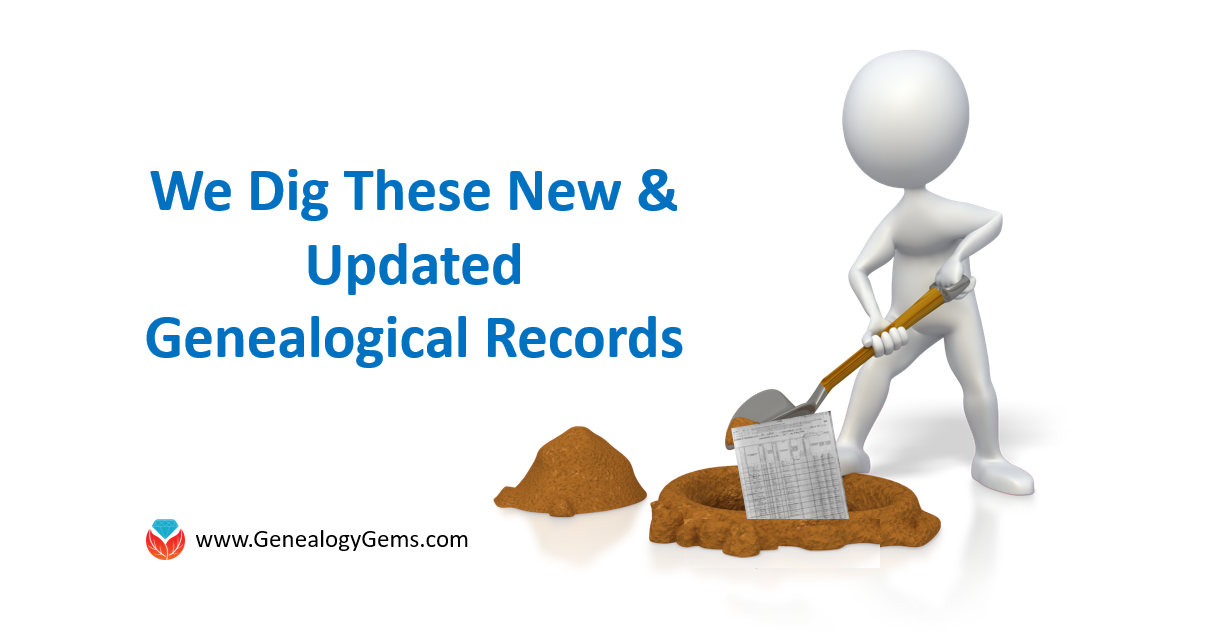
IRELAND – RECORDS, GUIDES, AND BOOKS
The New England Historical and Genealogical Society is offering access to their Irish resources for FREE for a limited time. So hurry before it ends on August 9th and see what luck you have digging up your Irish ancestors.
You will need to sign-up, but remember, it’s free. Once you have logged on, you will begin your search here.
Many Irish researchers have difficulty finding records because of the destruction of the Public Record Office in 1922. Not only can you browse the records available, but also the subject guides and books for Irish genealogy.
UNITED STATES – PENNSYLVANIA – NATURALIZATION RECORDS
The Chester County, Pennsylvania website has made their naturalization indexes available for the year span of 1798-1935. To search their indexes is free, but there is no name search field. You may have to scan several pages to find the record that may interest you. The database is also available to search from Ancestry.com and allows you to search by name, date of event, and place of origin.
The index of naturalizations include the name of the individual, name of native country, and a date. The original record could hold additional information. You can request a copy of the original record from their webpage. To learn more about that, click here.
UNITED STATES – NEVADA – MARRIAGE & DIVORCE
The most difficult records too find are often those that were created within the last 50 years. Due to the scarcity of recent records, we are pleased to see Ancestry has added a new database titled Nevada, Marriage Certificates, 2002-2015. You can search by name, date, location, and spouses name.
The digital image of the marriage records differs from year to year and location to location, but generally, you will find the couples’ names, ages, date and location of the marriage, and the person who officiated the wedding.
Nevada, Divorce Records, 1968-2015 has recently been updated on Ancestry as well. This index includes nearly half a million divorce records. You can use the index to locate the county the divorce took place, and then contact that county for the original records. You won’t find the reason for divorce in this index, but you can find the county of divorce and the divorce file number that will help locate the further records you want.
UNITED STATES – NEBRASKA – PASSENGER LISTS
A passenger list database for Omaha, Nebraska? Yep, but these are passenger and crew lists of air manifests between the years of 1958-1965. The collection is titled Omaha, Nebraska, Passenger and Crew Manifests of Airplanes, 1958-1965. If your Omaha relative did a lot of air travel, these records may be of interest to you. These records were were recorded on a variety of forms turned over to the Immigration and Naturalization Service. Some details included the name of the airline, type of aircraft, flight number, places of departure and arrival, dates of departure and arrival, full name, age, gender, physical description, military rank (if any), occupation, birthplace, citizen of what country, and residence. For military transports, you may even find the next of kin, relationships, and addresses. Later, manifests may include visa or passport numbers.
UNITED STATES – MINNESOTA – PASSENGER LISTS
The same is true in this database, Minnesota, Passenger and Crew Lists, 1957-1962 at Ancestry. This collection includes both air travel and ships coming into Minnesota ports. The original records were originally digitized by the National Archives and Records Administration. Information you may collect from these digital images include:
- Name
- Age
- Gender
- Ethnicity, nationality or last country of permanent residence
- Destination
- Arrival date
- Port of arrival
- Port of departure
- Ship name
UNITED STATES – GEORGIA – BONDS AND LICENSES
Ancestry has added the Savannah, Georgia, Licenses and Bonds, 1837-1909 database this week. You will find digital images of records from the City of Savannah’s Clerk of Council relating to people and businesses. These records usually include the name of person’s name, occupation, name of business, record date, record place, and subject.
UNITED STATES – FREEDMEN RECORDS
FamilySearch has updated two of their existing collections within the Freedmen Bureau Records. The United States, Freedmen’s Bureau Ration Records,1865-1872 and the United States, Freedmen’s Bureau, Records of the Superintendent of Education and of the Division of Education, 1865-1872 have been able to be browsed for some time. While not all the records have been indexed by name for easy searching, many have. You will want to first run a search by your targeted name. You can browse all the digitized images, but it won’t be easy. The ration records are not filed by county, but by film number. However, if you want to browse the collection of education records, they are searchable by state, then date.
MORE GEMS ON IRISH GENEALOGY
Beginning Irish Genealogy: Tips and FREE Records
A Comprehensive Way to Learn How to Research Irish Genealogy
Irish Genealogy: Find Your Poor Ancestors in Ireland
by Lisa Cooke | Mar 4, 2014 | 01 What's New, Family History Podcast, Irish, Mobile, RootsMagic, Source Citation
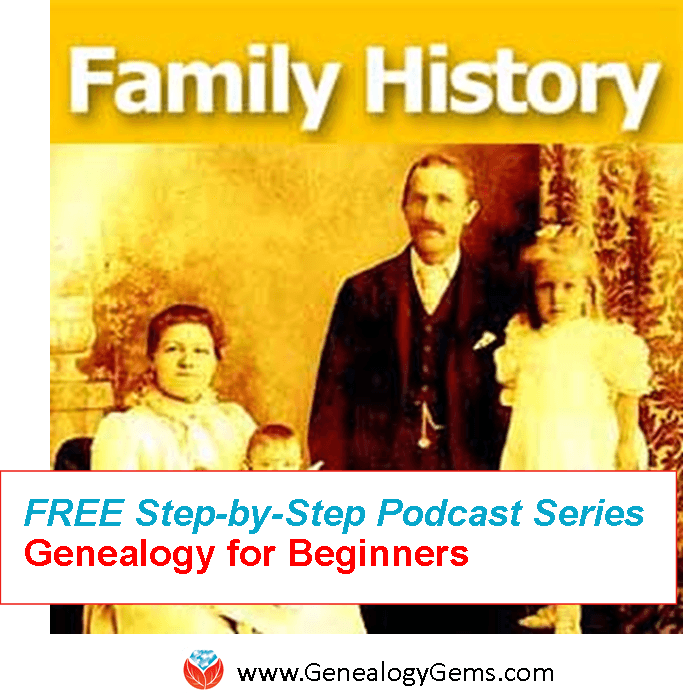
Listen to the Family History: Genealogy Made Easy podcast by Lisa Louise Cooke. It’s a great series for learning the research ropes and well as refreshing your skills.
Originally published 2009. Republished March 4, 2014
https://lisalouisecooke.com/familyhistorypodcast/audio/fh21.mp3
Download the Show Notes for this Episode
Welcome to this step-by-step series for beginning genealogists—and more experienced ones who want to brush up or learn something new. I first ran this series in 2008-2009. So many people have asked about it, I’m bringing it back in weekly segments.
Episode 21: RootsMagic and Irish Genealogy
Lacey Cooke guest-hosts this double-feature episode on two big topics in family history: RootsMagic genealogy software and how to get started in Irish research.
In the first segment you’ll from Bruce Buzbee, president and founder of RootsMagic Genealogy Software. He talks about his industry-leading software, RootsMagic, which you can try in basic form for free (RootsMagic Essentials) or purchase with all the bells and whistles (totally worth it!) for $29.95.
And in our second segment you’ll hear from Judith Wight. This is a very timely conversation since we are soon to celebrate St. Patrick’s Day and Judith is a professional genealogist whose specialty (and personal passion) is Irish research. This is your chance to learn from a master about how to find those elusive Irish ancestors! Listen for her tips on finding Church of Ireland records, civil registrations, estate records and how history helps us understand gaps in the records.
More Irish Research Links!
Irish Genealogy
RootsIreland
by Lisa Cooke | Sep 29, 2017 | 01 What's New, Australian, British, Irish, Newspaper, Records & databases |
If you’re looking for Irish ancestors, you’ll be delighted by all the new Irish record collections added this week! Also in this week’s new and updated record collections are court records and newspapers for Australia, parish records and more for England, millions of new Dutch records, South African probate records, and digitized newspapers across the United States.
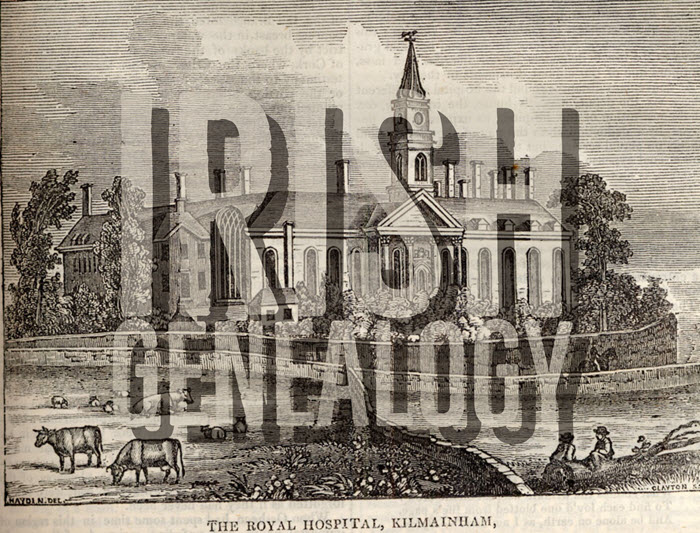
Irish Genealogy: Thousands of New Records

If you have ancestors from Ireland who received an army pension between 1724 and 1924, you’ll want to explore Fold3’s new collection of Royal Hospital Kilmainham Pensioner Discharge Documents. This collection is made up of certificates of pensioners of the Royal Kilmainham Hospital in Ireland. According to the collection: “For each record, details given include, where available: a brief description of the pensioner together with age, place of birth, particulars of service and the reason for discharge.”
New this week at Findmypast are Dublin Electoral Rolls. This new collection contains more than 427,000 transcripts and pertains to eligible voters located in the city of Dublin between 1908 and 1915. (FYI: You can also search Dublin City Electoral Lists 1908-1915 and other records for free from the Dublin City Council’s Civil Records webpage.)
Lastly, Irish records got a big update over at the Irish Genealogical Research Society (IGRS): 5,000 records have been added to IGRS’s Early Irish Birth, Marriage, and Death Indexes. This brings their total number of names to almost 260,000. From the announcement: “This particular update draws from a range material: surviving 19th century census records; marriage licence indexes; pre-1922 abstracts from exchequer and chancery court records; memorial inscriptions; biographical notices from newspapers; a large number of long forgotten published works on particular families and places; and memorials from Ireland’s Registry of Deeds.”
New Resources for Australia
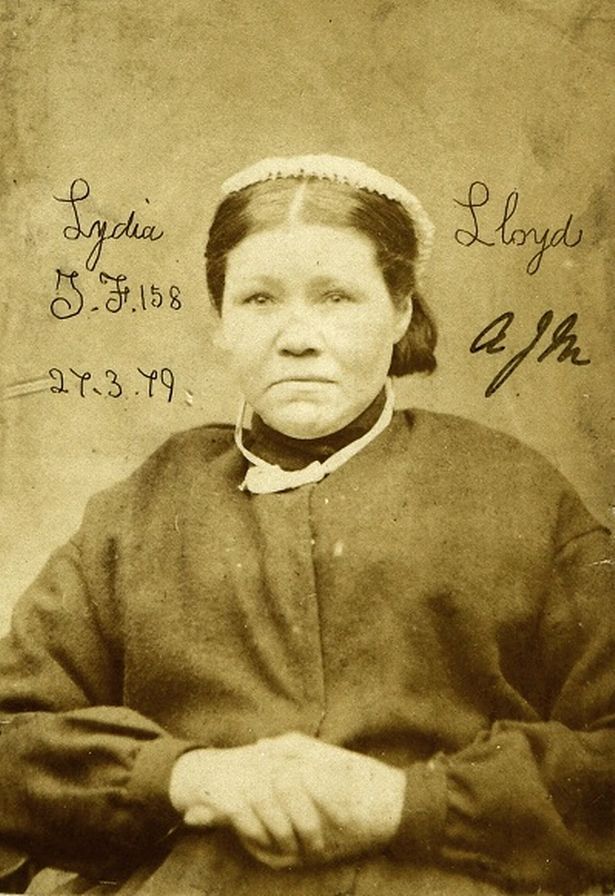 A fascinating new free website, Tracing London Convicts in Britain & Australia, 1780-1925 allows “genealogists and family historians to discover the fate of ancestors convicted of crimes and transported overseas.” This new website allows you to search millions of records from around fifty data sets, relating to the lives of 90,000 convicts from the Old Bailey. Pictured right: Lydia Lloyd, a Victorian era convict. (Image: The National Archives UK ref. PCOM4/71/6 (image 00001))
A fascinating new free website, Tracing London Convicts in Britain & Australia, 1780-1925 allows “genealogists and family historians to discover the fate of ancestors convicted of crimes and transported overseas.” This new website allows you to search millions of records from around fifty data sets, relating to the lives of 90,000 convicts from the Old Bailey. Pictured right: Lydia Lloyd, a Victorian era convict. (Image: The National Archives UK ref. PCOM4/71/6 (image 00001))
From the State Library of New South Wales Australia: The Lone Hand (1907-1921) newspaper has been digitized and made available through Trove. “Modelled on the London Strand and founded by J.F. Archibald and Frank Fox, The Lone Hand was a monthly magazine of literature and poetry, with illustrations by significant Australian artists of the time.”
England: Parish & Court Records
Ancestry.com has two new collections this week for England. Staffordshire Extracted Church of England Parish Records, 1538-1839 includes records for baptisms/christenings, burials, marriages, tombstone inscriptions, obituaries, tax lists, wills, and other miscellaneous types of records for Staffordshire, England. Also included are some records from non-conformist churches. Extracted Parish and Court Records, 1399-1795 is a collection of historical parish registers throughout England.
Also new for England, TheGenealogist has added over 1.1 million individuals to its Sussex County parish record collection. This update includes 717,000 baptisms, 213,000 marriages, and 208,000 burials.
Over at Newspapers.com, The Atlas newspaper has now been digitized. The London area paper operated from 1826 to 1869, and comprised a mixture of national and international social and political news, along with literary, theater, and music reviews. Another new newspaper available online is The Worthington Herald, from 1920-1959 in Worthington, West Sussex, England.
Millions of Dutch Records
FamilySearch has recently published millions of Dutch records (51 million to be exact) from the Netherlands, making it easier than ever to trace your Dutch roots. These new records have increased FamilySearch’s collection of Dutch names from 4,074,736 to over 55 million. From the collection description: “Archives around the Netherlands have contributed indexes which cover many record sources, such as civil registration, church records, emigration lists, military registers, and land and tax records.” Click here to search the collection.
South Africa Probate Records
New at FamilySearch: South Africa, Cape Province, Probate Records of the Master of the High Court, 1834-1989. This impressive collection is comprised of over 155,000 indexed records and 1.1 million digitized images! The original records are located in the Cape Archives Depot, Cape Town.
United States Newspapers
California. The Cal Poly University student newspaper has been digitized in honor of their 100 year celebration. 75,000 pages from 7,138 issues are now fully searchable online, thanks to optical character recognition (OCR) technology. Click here to explore the database.
North Carolina. Saint Mary’s Student School Newspaper, The Belles, is now online. Dating back to 1936 through 1995, the paper gives a good look into the viewpoint of North Carolina teen women over a 60 year period.
New Mexico. Now available at Newspapers.com is the Albuquerque Journal, with issues dating back to 1882. Almost 2 million pages are available to browse by date.
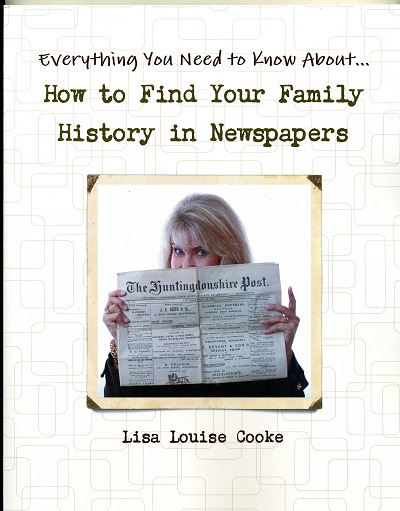
There’s a wealth of information about your ancestors in newspapers! Lisa’s book, How to Find Your Family History in Newspapers, provides you with a foolproof research process for discovering them, and is stuffed with everything you need for genealogical success. Available in both print and ebook formats, you’ll get step-by-step instructions, worksheets, tons of free online resources, case studies, and more!
Disclosure: This post contains affiliate links and Genealogy Gems will be compensated if you make a purchase after clicking on these links (at no additional cost to you). Thank you for supporting Genealogy Gems!
by Lisa Cooke | Oct 30, 2017 | 01 What's New, Archive Lady, Volunteer
The National Archives Citizen Archivist program is recruiting help to tag, transcribe, and comment on records in the U.S. National Archives catalog. This is a great way for genealogy volunteers to help others discover their family history in the National Archives and learn for themselves what’s there.
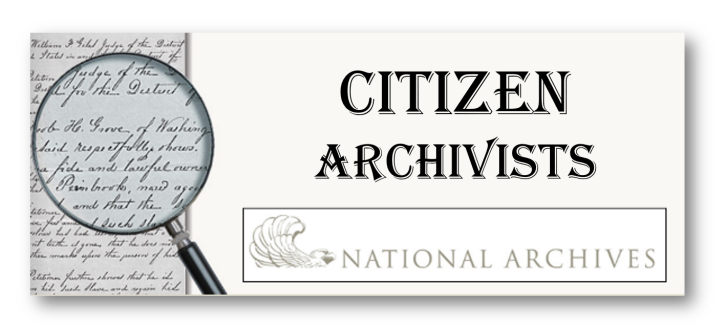
The National Archives Citizen Archivist Program
Have you heard? The U.S. National Archives is looking for Citizen Archivists! What is a Citizen Archivist, you ask? A Citizen Archivist is a virtual volunteer that helps the U.S. National Archives increase the online access to their historical records. This is done by crowdsourcing metadata about their records through tagging, transcribing, and adding comments to the U.S. National Archives catalog.
As a Citizen Archivist, you will be volunteering your time to make historical and genealogical records more accessible to the general researching public to help them with their research. This could include genealogists, historians, writers, and other researchers that will benefit from your volunteer work. And who knows, maybe you will find records that belong to your ancestors!
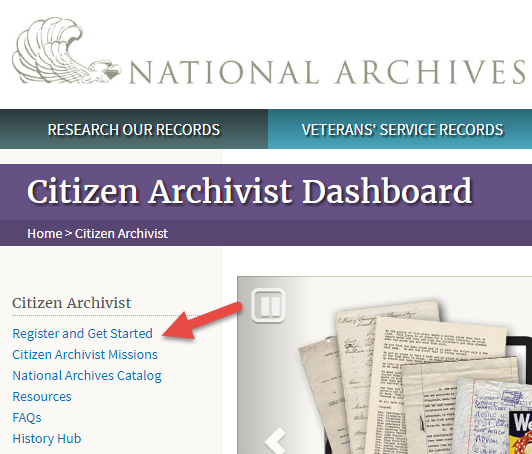 How to Get Started as a National Archives Citizen Archivist
How to Get Started as a National Archives Citizen Archivist
First, you will need to go to the “Citizen Archivist Dashboard” at the U.S. National Archives website. Once there, you will need to register to be a Citizen Archivist (see the screenshot on the right for where to click). Registration is free but you do need this account to be able to contribute to the project. Once you are registered and logged in, you can then navigate to the catalog and choose records from the curated missions.
The “missions” are groups of records that need transcribing or tagging to help the records be more accessible to researchers working online. Some of the missions that are needing transcribing are “Fugitive Slave Case Files,” “Native American Reservations,” and “The Truman-Churchill Telegrams,” just to name a few. New missions are added to the site regularly, so be sure to check back often to see what is new that you would like to work on.
Who Can Contribute as a Citizen Archivist?
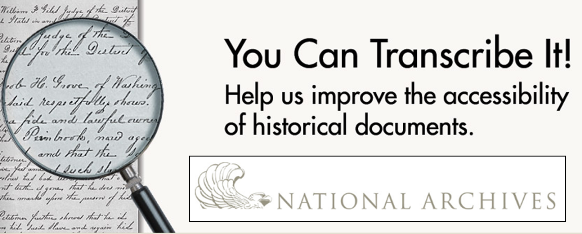 Anyone who has a computer and the willingness to volunteer time to this project can contribute. You do not need to commit to any amount of time; you can work at your own pace as you have the extra time. There is even a support community available through the “History Hub” that can answer your questions as you work through the records. (You can click on that at the bottom of the list shown in the screenshot above.)
Anyone who has a computer and the willingness to volunteer time to this project can contribute. You do not need to commit to any amount of time; you can work at your own pace as you have the extra time. There is even a support community available through the “History Hub” that can answer your questions as you work through the records. (You can click on that at the bottom of the list shown in the screenshot above.)
So, if you have some time on your hands and want to help make historical and genealogical records more accessible online, why not become a Citizen Archivist today? Click here to get started–or click below to read more ideas about how to give back to the genealogy community.
 The Unclaimed Persons Project
The Unclaimed Persons Project
Help Curate Holocaust-Era Newspaper Articles
Transcribe GPS Gravestone Images at BillionGraves






 A fascinating new free website,
A fascinating new free website, 

 How to Get Started as a National Archives Citizen Archivist
How to Get Started as a National Archives Citizen Archivist
 The Unclaimed Persons Project
The Unclaimed Persons Project